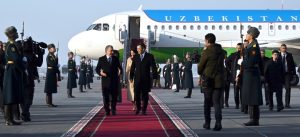After months of postponements, Uzbek President Shavkat Mirziyoyev finally touched down in Bishkek, the capital of neighboring Kyrgyzstan, on January 26 for a two-day state visit.
Kyrgyz President Sadyr Japarov met Mirziyoyev at the airport, greeting him on a red shyrdak with flowers. A woman in traditional dress offered plates of borsok, and the two presidents and their wives attended a concert of traditional Kyrgyz music, performed beside a yurt (inside, however; it is winter).
It was a warm and long-awaited welcome back to Bishkek for Mirziyoyev. The Uzbek president last visited Kyrgyzstan in June 2022, traveling to Cholpon-Ata for the fourth Central Asian Leaders’ meeting. Although Mirziyoyev also visited Bishkek in June 2019 for that year’s Shanghai Cooperation Organization (SCO) summit and Cholpon-Ata in September 2018 for a meeting of the then-Turkic Council, his last state visit to Kyrgyzstan was in 2017. That visit was historic, being the first such visit of an Uzbek president to Kyrgyzstan in 17 years.
The 2017 visit marked a turning point for Kyrgyzstan-Uzbekistan relations.
The trade realm provides one set of figures worth highlighting, though reporting on trade data can be tricky due to differences in phrasing and calculation. Using figures compiled by the Observatory of Economic Complexity (OEC), in 2016 Kyrgyzstan exported $125 million in goods to Uzbekistan and imported $68.1 million, for a trade turnover or balance of around $57 million. In 2020, Kyrgyzstan exported $155 million in goods to its neighbor and imported $757 million, for a trade turnover of $602 million, though the surplus has shifted to the Uzbek side. It has been reported by Uzbek government officials that trade turnover exceeded $1 billion in 2022, but the same sources cite the “volume of mutual trade” as $167.5 million in 2016.
At the Kyrgyzstan-Uzbekistan Business Forum taking place alongside the Mirziyoyev’s state visit this week, the Sardor Umurzakov, head of the Uzbek presidential administration, said bilateral trade had boomed since 2016. He would not cite specific figures, saying “they are far from existing potential.”
Whatever the precise figures, it’s clear that trade between the two countries has grown since the 2016 death of Uzbekistan’s longtime president, Islam Karimov, and Mirziyoyev’s rise to power. In that span of time, Kyrgyzstan has had three presidents: Almazbek Atambayev left office in November 2017 and his successor, Sooronbai Jeenbekov, was ousted by Japarov in October 2020 in the wake of protests.
Nowhere is the improvement in the bilateral relationship more obvious than on the border. Once a contentious bilateral issue, it is now a contentious domestic issue in Kyrgyzstan. It’s both the reason for Mirziyoyev’s visit and arguably the reason his arrival has been repeatedly postponed.
In October 2022, as Kyrgyz and Uzbek officials signaled the long-awaited settling of an agreement regarding a stretch of border including the Kempir-Abad (Andijan) Reservoir, Kyrgyz authorities swept up more than two dozen politicians and activists in a mass arrest triggered by their vocal opposition to (and efforts to organize against) the border agreement. The agreement was signed by the respective foreign ministers in early November, passed through the two parliaments in the following weeks, and then the two presidents signed the treaty into law separately at the end of the month.
A border treaty in Central Asia — a region where several disputed borders still chafe three decades after the collapse of the Soviet Union — is a monumental diplomatic achievement. It’s the kind of thing red carpets, or in Kyrgyzstan’s case a red shyrdak, are rolled out for. Mirziyoyev’s state visit was described as “upcoming” in September, October, and November 2022; a date was announced in early December and then postponed again. With such an important visit, the optics matter.
As I wrote earlier this month, the Kempir-Abad dissenters remain in pre-trial detention facing serious charges (though somewhat ironic, coming from the Japarov government) of plotting a coup. Their detention was extended in December into February, providing a new window for a state visit with the most vocal agitators behind bars. Bishkek’s repeatedly extended ban on protests in the city’s best protest spots — such as Ala-Too Square — also helps.
Previewing the visit, the head of the Kyrgyz Presidential Administration’s foreign policy department, Muratbek Azymbakiev, said bilateral negotiations would be held in both narrow and expanded formats to discuss “a wide range of issues of the Kyrgyz-Uzbek strategic partnership, as well as plans for the further development of relations in the spirit of friendship, brotherhood and good neighborliness.” He said a “number of bilateral documents” would be signed.
The border agreement, although already signed and ratified, is expected to be among them.
































